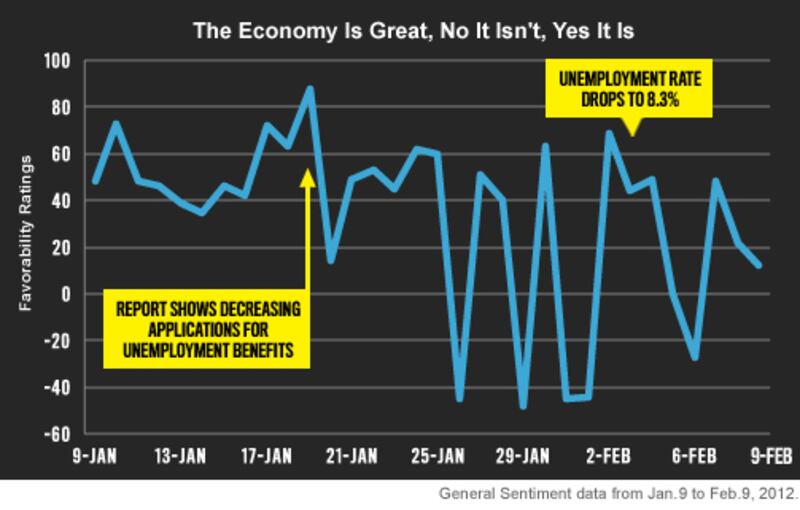
You've heard it here, you've heard it everywhere: the 2012 election won't hinge on foreign policy or domestic programs or even personality, at least not much. It is a referendum on the economy, and how much Barack Obama has done to improve it.It's a funny thing, the economy, and nearly impossible to know how it's actually doing. There are some indicators to rely on -- the unemployment rate, the size of the labor force, commodity values -- but none ever tell the full story of U.S. financial growth and stability. So the real question becomes: how to voters feel about the economy? Surprisingly moderate, it turns out. The Election Oracle finds the word "economy" to garner neither prolonged praise nor scorn online. When measured Thursday, the word registered a web favorability of 12, almost squarely in the middle of our scale from -100 to 100.

To determine favorability ratings, the Election Oracle tracks 40,000 news sites, blogs, message boards, Twitter feeds, and other social-media sources to analyze what millions of people are saying about the issues—and determines whether the Web buzz is positive or negative. (See methodology here.)
People's perceptions of U.S. economic health can be as unstable as the Richter scale. A new unemployment report comes out showing private sector job growth and the web registers people buzzing about a "improving" economy on an "upswing." Another report showing stagnant home values will elicit mentions of a "sagging" or depressed" market. But strong online perceptions rarely stay for long. The next indicator or economic report to come along can make people's perceptions rise or fall dramatically.
The takeaways, then, are twofold. The fact that web users are so fickle about how the nation's fiscal health suggests the economy may not matter as much as pundits will tell you. Average the peaks and valleys and the aggregate reaction becomes akin to a collective shrug. And secondly, for voters who do have strong opinions about U.S. and global economy health, it's the most current indicators that matter most, rather than a long-term tally of the past. That suggests that despite President Obama and the GOP candidates hawking their economic messages now, eight months before the general election, it will be voters' perceptions in the days and weeks before November 2, naturally, that will matter most.
The Election Oracle is updated with new data every weekday morning. Find it via email at Oracle@newsweekdailybeast.com, or on Twitter at @ElectionOracle.





